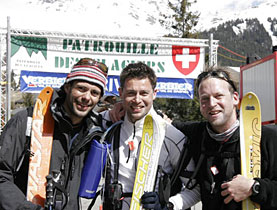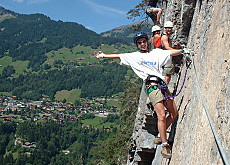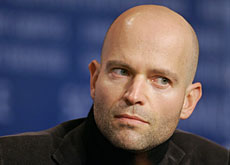Interlaken stays in the adrenalin business

Every year, a growing number of tourists hurtle themselves off gondolas, down steep slopes and into rivers in and around the resort of Interlaken.
An epidemic of sorts in Europe’s so-called adventure capital. It is all relatively safe, of course – for each blood-curdling scream and the accompanying adrenaline rush, there is a bungee cord, parachute or helmet.
And almost certainly large chunks of tourist money are invested in the experience.
Some of the continent’s more breathtaking vistas, an unyielding supply of foreign visitors and a cadre of motivated local promoters play a role in Interlaken’s popularity too.
The town’s hoteliers, hostel operators and adventure companies have over the past decade worked hard to differentiate the region from the rest of Switzerland.
“For a long time, Interlaken was just everything for everyone,” Susanne Daxelhoffer, a spokeswoman for Interlaken Tourism, told swissinfo. Her association covers Interlaken and is a marketing partner with other villages in the Bernese Oberland.
“Adventure is part of our strategy. It really fits quite well because the scene has increased a lot during the last years,” she said.
Mountain biking, paragliding, skydiving, canyoning and bungee jumping attract legions of adventure-seekers from around Europe and beyond.
Apart from sandal-wearing, rucksack-toting North American university students on a summer holiday or perhaps passing through as part of a pan-European last hurrah before the onset of adulthood, the town plays host to increasingly affluent travellers from the east.
Asian adventurers
“The Asian market in Interlaken is really strong and has a long tradition,” said Daxelhoffer. “Especially the Koreans. They like to do a lot of adventure sports.”
A saunter through the streets anywhere between one of the town’s two railway stations and the storied Victoria Jungfrau hotel during the summer months confirms it.
Outside the region’s traditional markets – Germany, Japan and Britain – the industry has been taking a closer look at India and the Gulf states, Daxelhoffer says.
Julie Paterson, a New Zealander and 13-year veteran of the Swiss adventure tourism sector, says each country has its particularities.
“The Indians love paragliding and rafting, the Koreans love bungee jumping,” Paterson, a manager with Alpin Raft, one of Interlaken’s biggest adventure companies, told swissinfo. “The height of our season is July and August, when the majority of people have their holidays.”
Interlaken has a history of drawing glamorous holidaymakers; the town boasts two five-star hotels, and even James Bond, the legendary British spy, was briefly imprisoned by villains on the top of the nearby Schilthorn in the 1969 film, On Her Majesty’s Secret Service.
He would later escape in dramatic fashion by skiing down the mountain, capping an experience of both luxury and adventure.
These days, tourists of the less clandestine variety are shifting their own priorities – many are choosing to forego the experience of a luxury hotel and are instead spending on adventure.
Spending trends
“Packages are quite important because a lot of our clientele are college kids,” said Patterson. So they’re trying to save a bit of money. Indians, it’s a cultural thing. They always like to barter about the price. So do Koreans actually. They love a discount.”
“We try to eat cheaply, so we go to the markets,” said Trevor, a 25-year-old medical school graduate from Canada.
He and travelling companion Brynn chose Switzerland as one stop on a three-week, three-country European trip. They had budgeted around $6,000 (SFr6,200) for the tour and said they planned on paragliding. “We are willing to spend a lot more on that kind of thing,” he added.
Tourism officials estimate that backpackers spend on average SFr153 daily on food, lodging and activities, an amount equivalent to a three-star hotel guest.
Since 2000, the number of backpackers staying in Interlaken has steadily risen. Eight years ago, there were roughly 59,000 bookings in area hostels. By 2007, the number was between 100,000 and 120,000 out of around 800,000 total overnight stays.
Tourism officials expect the numbers to grow; there is little that will reverse the trend anytime soon, said Paterson.
“Interlaken is a strange place. It doesn’t matter if there’s a war happening, it doesn’t matter if there’s Bird Flu, it doesn’t matter whether the dollar’s weak… people just always come here. We’ve never had a big slump in tourism.”
swissinfo, Justin Häne in Interlaken
The town of Interlaken sits between Lake Brienz and Lake Thun in the Bernese Oberland.
It is of the oldest and most popular tourist destinations in Switzerland.
Its foundations date to the creation of an Augustine monastery there, first documented in 1133.
Divided by the Aare River, it is situated 570 metres above sea level and has a population of 5,700.
Its name is a derivative of the Latin term “inter lacus” describing its geographical position, and came about in 1891 after the local council applied to change it from Aaremühle.
The neighbouring municipality of Unterseen shares the same name but in a different language – Middle High German, spoken from 1050-1330.
Switzerland introduced tough regulations on adventure sports after a 1999 canyoning accident in the Bernese Oberland killed 21 people, including 14 Australians.
The accident occurred after flash floods poured through the canyon, sweeping some in the party to their deaths.
Over 30 firms, including Interlaken’s two major adventure companies, are now registered with Safety in Adventures, an oversight partnership that includes tourism offices, government agencies, insurers and industry associations.

In compliance with the JTI standards
More: SWI swissinfo.ch certified by the Journalism Trust Initiative



You can find an overview of ongoing debates with our journalists here. Please join us!
If you want to start a conversation about a topic raised in this article or want to report factual errors, email us at english@swissinfo.ch.